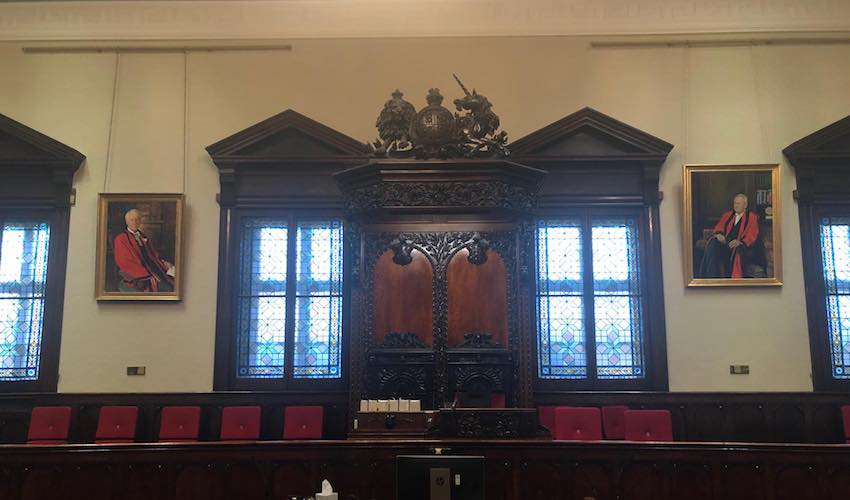

A convicted rapist has failed to overturn his guilty verdict, after alleging he was the victim of a “miscarriage of justice”.
The individual - who was kept anonymous in the Court of Appeal’s written judgment - was convicted of two counts of rape on a teenage girl several decades ago, after plying her with alcohol.
Despite allegations that “fantastical” and “simply made up” evidence from his victim, an “unnecessarily emotive” speech from the prosecution, and poor advice from his lawyer damaged his right to a fair trial, the Court of Appeal ultimately ruled that he simply “disagrees with the jury’s verdict”.
The offender’s appeal to quash his conviction was heard by Mr Jonathan Crow QC, Mr David Perry QC and Sir William Bailhache earlier this month.
He argued that the victim’s evidence had been “unconvincing”, adding that the fact the jury’s verdict was not unanimous, proved “its unsatisfactory nature”.

Pictured: The rapist appealed to have his conviction quashed on the basis that the victim’s evidence had been “unconvincing”.
His lawyer, Advocate David Steenson, went as far as describing the evidence as “confused, illogical, fantastical; inconsistent (internally and externally); comprised of ex post facto rationalisations; and/or simply made up.”
The convicted man’s lawyer also pointed out what he saw as several failings during the proceedings, including the prosecution’s opening speech to the jury which he said had caused him a “prejudicial impact” because it was “unnecessarily emotive” and likely to incite sympathy for the complainant”.
He described the guilty verdicts as “the products of confusion” and described the directions of the judge as “unwieldy and too complex for the jury properly to digest”.
The man further argued that the lawyer that had assisted him during the trial wrongly advised him not to take to the dock to give evidence, going on to state that the failures of his counsel were “so fundamental” they had deprived him of a fair trial.
He also criticised the prosecution and his own lawyer in relation to the disclosure of unused material.
The offender therefore argued that that the convictions should be set aside, as they were “unreasonable” or couldn’t be supported by the evidence. He also submitted his trial had been invalidated by “legal error resulting in a miscarriage of justice”.

Pictured: Crown Advocate Emma Hollywood said the victim had been “a convincing and credible witness who gave powerful and consistent testimony of the sexual assaults”.
Crown Advocate Emma Hollywood, who appeared for the prosecution during the trial, opposed the appeal saying the trial had been “in all respects fair” while that the verdicts were no more than “a reflection of the compelling nature of the prosecution evidence”.
She said the victim had been “a convincing and credible witness who gave powerful and consistent testimony of the sexual assaults”.
The Court of Appeal rejected all of the arguments put forward by the appellant and his advocate.
They concluded there had been “ample evidence” for the jury to consider, noting that the fact neither of the accused had submitted there was no case to answer, represented a “realistic acknowledgement” on their part that the jury, properly directed, could properly convict them on each of the counts in the indictment.

Pictured: The Court of Appeal rejected all of the arguments put forward by the offender.
“The Appellant’s arguments to the effect that ‘in the round, the Complainant’s evidence was unconvincing’ are merely an attempt to recycle submissions that were made to and rejected by the jury,’ they added.
They further argued that a majority verdict “in no way bears upon the safety of the conviction” as the law allows for conviction by a majority.
The Court issued a reminder that behavioural stereotyping has no place in a criminal trial - no matter the offence involved - noting that most of the criticisms against the victim reflected “untested assumptions” of how a victim might react to sexual abuse.
“Every allegation of whatever nature should be judged without preconception and on its own individual merits,” the Court wrote in their judgment.

Pictured: The Court of Appeal said the prosecution case had been presented with “skill and conspicuous fairness”.
They also rejected the man's claims about the opening speech, saying it was “factually correct” while the whole case had been presented with “skill and conspicuous fairness”.
“In our view this complaint lacks merit and we are surprised that it was ever raised as a basis for challenging the conviction,” they added.
Further agreeing that the verdict should not be overturned, they continued: “The entire system of jury trial is based upon the assumption that the jury will follow the instructions which they receive from the trial judge and that they will return a true verdict in accordance with the evidence."
The Court of Appeal also rejected the criticism levelled at the offender's lawyer during the trial, which they branded as “misconceived”, agreeing with each of the decisions he had made and his “professional opinion”. “In our view, [he] conducted the Appellant’s case with all the care and skill that such a serious case deserved,” they wrote.
They dismissed the appeal against his conviction, concluding that, in their view, his real complaint was that “he disagrees with the jury’s verdict”.
Comments
Comments on this story express the views of the commentator only, not Bailiwick Publishing. We are unable to guarantee the accuracy of any of those comments.